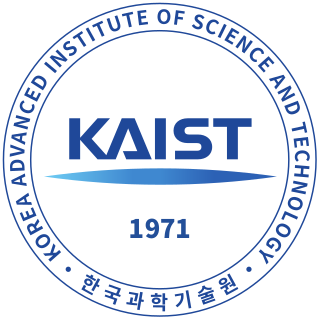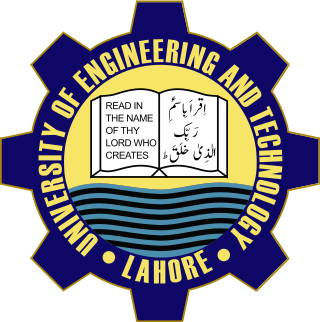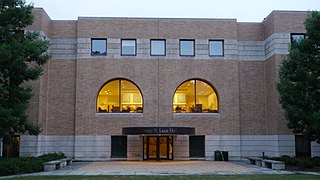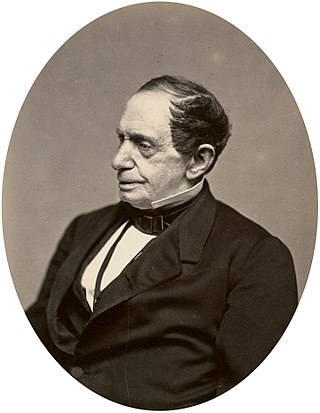
Brown University is a private Ivy League research university in Providence, Rhode Island. It is the seventh-oldest institution of higher education in the United States, founded in 1764 as the College in the English Colony of Rhode Island and Providence Plantations. One of nine colonial colleges chartered before the American Revolution, it was the first college in the United States to codify in its charter that admission and instruction of students was to be equal regardless of their religious affiliation.

The Korea Advanced Institute of Science and Technology (KAIST) is a national research university located in Daedeok Innopolis, Daejeon, South Korea. KAIST was established by the Korean government in 1971 as the nation's first public, research-oriented science and engineering institution. KAIST is considered to be one of the most prestigious universities in the nation. KAIST has been internationally accredited in business education, and hosts the Secretariat of the Association of Asia-Pacific Business Schools (AAPBS). KAIST has 10,504 full-time students and 1,342 faculty researchers and had a total budget of US$765 million in 2013, of which US$459 million was from research contracts.

Peking University is a public university in Haidian, Beijing, China. It is affiliated with and sponsored by the Ministry of Education of China. The university is part of Double First Class University Plan, former Project 985, and former Project 211.

Harvard Law School (HLS) is the law school of Harvard University, a private research university in Cambridge, Massachusetts. Founded in 1817, Harvard Law School is the oldest continuously operating law school in the United States.

The UC Berkeley College of Chemistry is one of the fifteen schools and colleges at the University of California, Berkeley. It houses the department of chemistry and the department of chemical and biomolecular engineering, both of which are ranked among the best in the world. Its faculty and alumni have won 18 Nobel Prizes, 9 Wolf Prizes, and 11 National Medals of Science.

The Radcliffe Institute for Advanced Study at Harvard University, also known as the Harvard Radcliffe Institute, is an institute of Harvard University that fosters interdisciplinary research across the humanities, sciences, social sciences, arts, and professions. It is the successor institution to the former Radcliffe College, originally a women's college connected with Harvard.
Trinity College of Arts and Sciences is the undergraduate liberal arts college of Duke University. Founded in 1838, it is the original school of the university. Currently, Trinity is one of three undergraduate degree programs at Duke, the others being the Edmund T. Pratt School of Engineering and Duke Kunshan University.

The University of Engineering and Technology, Lahore is a public university located in Lahore, Punjab, Pakistan specializing in science, technology, engineering, and mathematics (STEM) subjects. It is the oldest and one of the most selective engineering institutions in Pakistan.
Jewish studies is an academic discipline centered on the study of Jews and Judaism. Jewish studies is interdisciplinary and combines aspects of history, Middle Eastern studies, Asian studies, Oriental studies, religious studies, archeology, sociology, languages, political science, area studies, women's studies, and ethnic studies. Jewish studies as a distinct field is mainly present at colleges and universities in North America.
Lawrence Seldon Bacow is an American economist and retired university administrator. He was the 29th president of Harvard University from 2018 to 2023. Before that, Bacow was the Hauser leader-in-residence at the Center for Public Leadership at Harvard Kennedy School.

The COMSATS University Islamabad (CUI), formerly known as COMSATS Institute of Information Technology (CIIT), is a public university in Pakistan. It is a multi-campus university with its principal seat located in Islamabad. Comsats was envisioned as Pakistan's first exclusive Institute of Information Technology. In the latest QS University Rankings, CUI ranked 7th in Pakistan and 801-1000 in the world. Nationally it is ranked top-most in Computer Sciences and IT category. COMSATS University Islamabad (CUI) is under the administration of the Commission on Science and Technology for Sustainable Development in the South.

The Elliott School of International Affairs is the professional school of international relations, foreign policy, and international development of the George Washington University, in Washington, D.C. It is highly ranked in international affairs and is the largest school of international relations in the United States.

The Whitney and Betty MacMillan Center for International and Area Studies at Yale, commonly known as the MacMillan Center, is a research and educational center for international affairs and area studies at Yale University. It is named after Whitney MacMillan and his wife Betty.

Harvard University is a private Ivy League research university in Cambridge, Massachusetts. Founded in 1636 as Harvard College and named for its first benefactor, the Puritan clergyman John Harvard, it is the oldest institution of higher learning in the United States.

The George Washington University School of Business is the professional business school of George Washington University in Washington, D.C. The GW School of Business is ranked as one of the top business schools in the United States, with globally ranked undergraduate and graduate programs. GW's campus is also adjacent to some of the world's leading financial institutions, including the Federal Reserve, World Bank, and International Monetary Fund.

The Bush School of Government and Public Service is an undergraduate and graduate college of Texas A&M University founded in 1997 under former US President George H. W. Bush's philosophy that "public service is a noble calling." Since then, the Bush School has continued to reflect that notion in curriculum, research, and student experience and has become a leading international affairs, political science, and public affairs institution.
The Tepper School of Business is the business school of Carnegie Mellon University. It is located in the university's 140-acre (0.57 km2) campus in Pittsburgh, Pennsylvania.
Tomiko Brown-Nagin is an American law professor, historian, author, and university leader. She is dean of Harvard Radcliffe Institute, one of the world's leading centers for interdisciplinary research across the humanities, sciences, social sciences, arts, and professions. She is also the Daniel P.S. Paul Professor of Constitutional Law at Harvard Law School and a Harvard University professor of history.

The Princeton University Department of Economics is an academic department of Princeton University, an Ivy League institution located in Princeton, New Jersey. The department is renowned as one of the premier programs worldwide for the study of economics. The university offers undergraduate A.B. degrees, as well as graduate degrees at the Ph.D. level. It is often considered one of the "big five" schools in the field, along with the faculties at the University of Chicago, Harvard University, Stanford University, and MIT. According to the 2023-2024 U.S. News & World Report, its graduate department is ranked as the joint No. 4 in the field of economics, in a four-way tie between it, the University of Chicago, Yale University, and the University of California, Berkeley.

The role of slavery at American colleges and universities has been a focus of historical investigation and controversy. Enslaved Africans labored to build institutions of higher learning in the United States, and the slave economy was involved in funding many universities. People, forced to labor and seen as less than human, were used to build academic buildings and residential halls. Though slavery has long been presented as a uniquely Southern institution, colleges and universities in Northern states benefited from the labor of slaves. The economics of slavery brought some slave owners great wealth, enabling them to become major donors to fledgling colleges. Many colleges founded in states with legalized slavery utilized enslaved people and benefited from the slavocracy. Slaves were also sold by university administrators to generate capital. In some parts of the nation it was also not uncommon for wealthy students to bring an enslaved person with them to college. Ending almost 250 years of slavocracy did not end white supremacy, structural racism, or other forms of oppression at American colleges and the legacy of slavery still persists in many establishments.














